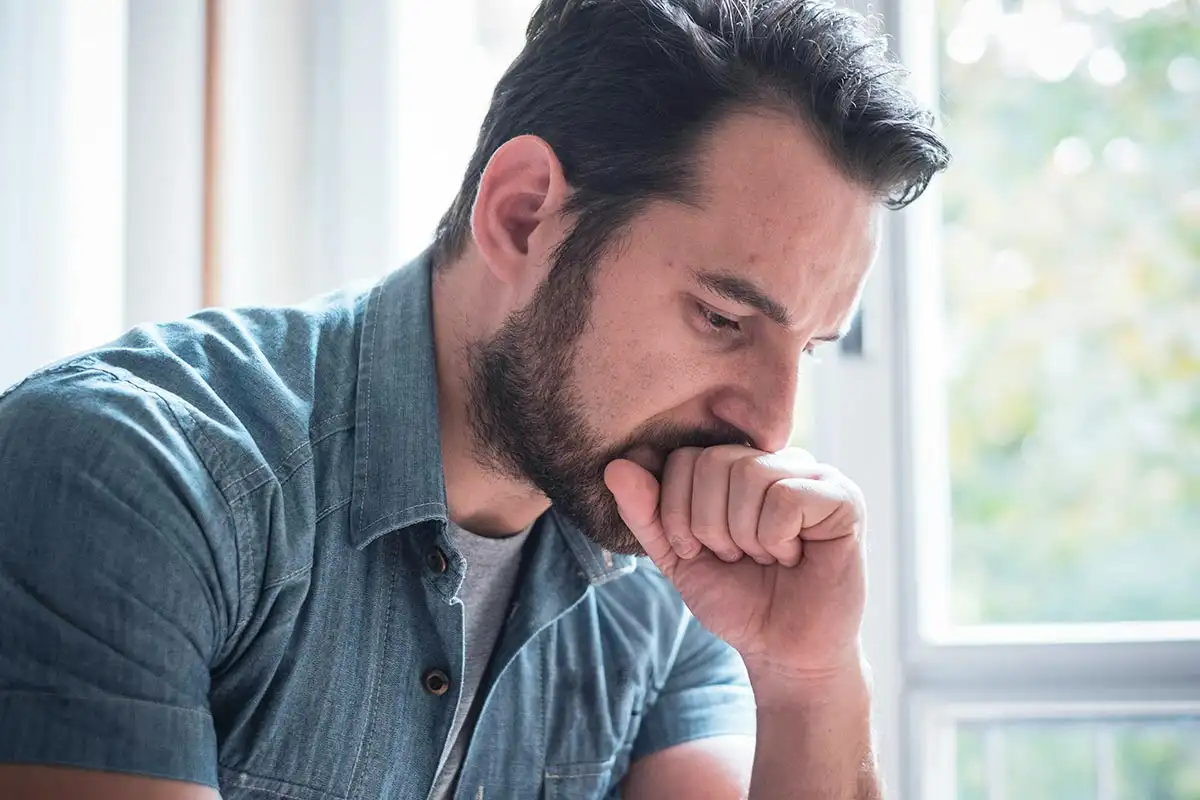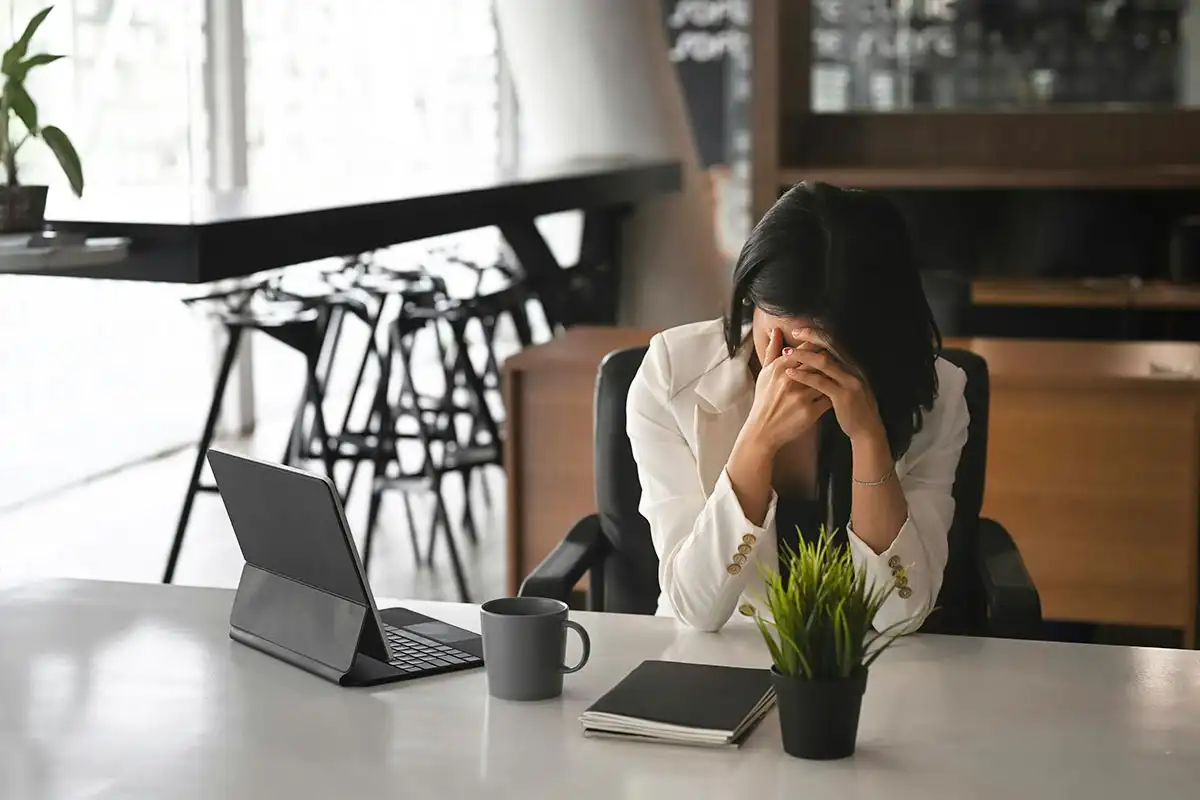
Anxiety and Substance Abuse: Breaking the Cycle in Los Angeles (2025)
Medically Reviewed by:

Dr. Marco M. Zahedi
Medical Director, Compassion Recovery Center

Dr. Michael Majeski
Licensed Psychologist (LP), Compassion Recovery Center
Table of Contents
Understanding the Entwined Struggles of Anxiety and Substance Use
Living with anxiety can feel like carrying a heavy weight, a constant hum of worry, fear, or unease that colors every aspect of your day. For many, this persistent distress becomes overwhelming, leading them to seek relief in any way possible. Substance abuse, the harmful or hazardous use of psychoactive substances, including alcohol and illicit drugs, often emerges as a misguided attempt to cope with these intense feelings. It might start as a way to “take the edge off,” quiet racing thoughts, or feel more comfortable in social situations. However, this temporary fix can quickly spiral into a dangerous cycle, where substances worsen anxiety in the long run, leading to increased use and deepening the hold of both conditions.
In a bustling and often high-pressure environment like Los Angeles, the prevalence of both anxiety disorders and substance use issues is a significant concern. The fast-paced lifestyle, economic pressures, and the sheer density of the population can contribute to heightened stress levels. For individuals already predisposed to anxiety or those developing it due to life circumstances, the temptation to self-medicate with readily available substances can be strong. We understand that reaching out for help can be the hardest step, but it’s also the most crucial one. If you or a loved one is caught in this cycle, know that compassionate, effective help is available. At Compassion Recovery Center, we specialize in providing drug rehab programs and alcohol rehab programs through accessible telehealth services, serving residents throughout Orange County and Los Angeles.
The concept of “breaking the cycle” is central to recovery. As we look towards the future, say, focusing on the year 2025, it’s about envisioning a path forward where individuals are empowered with the tools, support, and understanding to reclaim their lives from the grip of anxiety and addiction. This isn’t just about stopping substance use; it’s about addressing the underlying anxiety, healing emotionally, and building a resilient foundation for lasting well-being. The journey involves understanding how these two conditions fuel each other and learning healthier coping strategies. For many in Los Angeles struggling with anxiety and substance abuse, the prospect of finding flexible, confidential, and effective treatment can feel daunting. That’s why remote treatment options, like our Virtual IOP Program, are becoming increasingly vital, offering a lifeline to those who need it most, right where they are. Recognizing the problem is the first brave step; taking action to explore treatment options is the next. We encourage you to reach out today for a confidential conversation about how we can help.

Exploring the Deep Connection Between Anxiety and Substance Abuse
The relationship between anxiety and substance abuse is complex and bidirectional, meaning each condition can influence and worsen the other. It’s not uncommon for individuals experiencing persistent anxiety to turn to substances as a form of self-medication. The initial effects of certain drugs or alcohol can temporarily dampen anxious feelings, providing a fleeting sense of calm or confidence. For example, someone with social anxiety might drink alcohol to feel more at ease in social settings, or an individual with generalized anxiety disorder might use marijuana to quiet racing thoughts. While these substances might offer short-term relief, they often create a rebound effect, where anxiety returns with greater intensity once the substance wears off. This can lead to a cycle of increasing substance use to manage escalating anxiety, inadvertently paving the way for dependence and addiction.
Several types of substances are commonly abused by individuals struggling with anxiety. Alcohol is frequently used due to its initial relaxing effects, but it’s a depressant that can disrupt sleep and neurochemistry, ultimately increasing anxiety levels over time. Benzodiazepines, prescription medications like Xanax or Valium, are often prescribed for anxiety but have a high potential for dependence and addiction, especially when misused. Withdrawal from benzodiazepines can also trigger severe anxiety and panic attacks. Marijuana is another substance some use to self-manage anxiety, but for others, particularly with higher THC strains, it can induce paranoia and worsen anxiety symptoms. Opioids, while primarily pain relievers, can produce a temporary sense of euphoria and calm, leading some anxious individuals to misuse them, risking a dangerous and often devastating addiction. Understanding these patterns is crucial for effective dual diagnosis treatment, which addresses both the substance use disorder and the co-occurring anxiety simultaneously.
The impact of untreated anxiety on substance abuse is profound. When anxiety isn’t addressed through healthy coping mechanisms and professional support, the reliance on substances as a coping strategy can become deeply entrenched. This not only leads to the development of a substance use disorder but can also make the anxiety itself more severe and resistant to treatment. The substances can alter brain chemistry in ways that mimic or exacerbate anxiety symptoms. For instance, chronic alcohol use can deplete neurotransmitters responsible for mood regulation, leading to increased feelings of depression and anxiety. Furthermore, the life problems that often accompany substance abuse – such as financial difficulties, relationship conflicts, and health issues – can become new sources of stress and anxiety, further fueling the cycle. If you’re concerned about your substance use or that of someone you care about, it’s important to consider whether underlying anxiety might be playing a role. We invite you to check insurance coverage for our specialized programs designed to treat these co-occurring conditions. Addressing both the anxiety and the substance use concurrently offers the best path towards sustainable recovery and improved mental health treatment.
The Vicious Cycle of Anxiety and Substance Abuse
The interplay between anxiety and substance abuse often creates a self-perpetuating cycle that can feel impossible to escape. It frequently begins with anxiety – perhaps a general sense of unease, specific phobias, panic attacks, or social anxiety – causing significant distress. In an attempt to alleviate these uncomfortable feelings, an individual might turn to alcohol or drugs. The substance may initially provide the desired effect: a temporary reduction in anxiety, a moment of calm, or an artificial boost in confidence. This perceived relief, however fleeting, can reinforce the idea that the substance is a helpful coping mechanism. This is the first, deceptive step into the cycle.
As the effects of the substance wear off, anxiety often returns, sometimes with even greater intensity. This is due to several factors. Firstly, withdrawal symptoms from many substances, including alcohol, benzodiazepines, and opioids, can mimic or exacerbate anxiety symptoms, leading to agitation, restlessness, and panic. Secondly, chronic substance use can alter brain chemistry, disrupting the natural balance of neurotransmitters involved in mood and anxiety regulation. This means that the brain becomes less able to manage anxiety on its own, increasing reliance on the substance. Thirdly, the negative consequences of substance abuse – such as problems at work or school, financial strain, legal issues, and damaged relationships – create new sources of stress and anxiety. This heightened anxiety then drives the individual to seek relief by using the substance again, and the cycle continues, strengthening with each repetition. It becomes a trap where the supposed solution (substance use) becomes a primary driver of the problem (worsening anxiety and addiction).
Breaking this cycle presents significant challenges. One major hurdle is that the individual may not recognize the connection between their substance use and their anxiety, or they may believe they cannot cope with their anxiety without the substance. The immediate, albeit temporary, relief provided by the substance can be very seductive, making it difficult to choose long-term solutions that require more effort and patience. Furthermore, co-occurring anxiety and substance use disorders (a dual diagnosis) require integrated treatment that addresses both conditions simultaneously. Treating only one aspect often leads to relapse, as the unaddressed condition can trigger the other. For example, if anxiety is not managed effectively, the urge to self-medicate with substances can remain strong. Conversely, if substance use is stopped but the underlying anxiety persists, the risk of turning back to substances during times of high stress is significant. Stigma surrounding both mental health and addiction can also prevent individuals from seeking help. At Compassion Recovery Center, we understand these complexities and offer specialized dual diagnosis treatment designed to interrupt this harmful pattern. If you feel trapped in this cycle, remember that effective help is available. Start your free assessment today to explore how our programs can support you in “breaking the cycle of addiction.”

Anxiety and Substance Abuse in Los Angeles: A Look at 2025 Trends
As we consider the landscape of mental health and substance use in Los Angeles projected into 2025, it’s essential to acknowledge the existing pressures and emerging challenges that shape this environment. While precise future statistics are speculative, current trends suggest that urban centers like Los Angeles will continue to grapple with significant rates of both anxiety disorders and substance abuse. The fast-paced, competitive nature of life in a major metropolitan area, coupled with economic uncertainties and social pressures, can contribute to a pervasive undercurrent of anxiety for many residents. This environment, unfortunately, can also foster conditions where individuals may turn to substances as a coping mechanism. Projections for “anxiety and substance abuse Los Angeles 2025” would likely indicate a continued need for accessible and effective mental health and addiction treatment services, particularly those that can adapt to the diverse needs of the population.
Several emerging trends and challenges are anticipated to influence the situation in Los Angeles by 2025. The increasing prevalence of potent synthetic opioids, such as fentanyl, continues to pose a severe risk, often contaminating other illicit drugs and leading to accidental overdoses. The widespread availability and changing perceptions around substances like cannabis may also contribute to higher rates of use and, for some, dependence or exacerbation of anxiety. Furthermore, the rise of stimulant use, including methamphetamine and prescription stimulants, presents another layer of complexity, as these substances can significantly worsen anxiety and lead to other severe health consequences. Economic factors, such as housing instability and unemployment, can also act as significant stressors, potentially increasing vulnerability to both anxiety and substance misuse. Addressing these multifaceted challenges requires a comprehensive approach that includes prevention, early intervention, and accessible treatment options like our drug rehab programs.
The impact of the COVID-19 pandemic, which began years prior, is expected to have long-lasting effects on mental health and substance abuse rates well into 2025 and beyond. The periods of isolation, fear, grief, economic disruption, and uncertainty experienced during the pandemic significantly increased stress and anxiety levels for many. Studies have already shown a rise in anxiety disorders, depressive symptoms, and substance use as people sought ways to cope with these unprecedented challenges. For some, new patterns of substance use developed during this time, while for others, existing issues were exacerbated. The increased reliance on remote interactions also highlighted both the benefits and challenges of virtual living, including potential increases in conditions like social media addiction treatment needs, which can sometimes co-occur with anxiety and substance use. The aftermath of the pandemic underscores the critical need for robust mental health support systems and adaptable addiction treatment services, such as the virtual IOP program offered by Compassion Recovery Center, which can reach individuals wherever they are in California. If you’re struggling with the lingering effects of these challenging times, please get help now; you don’t have to face this alone.
Finding Hope: Treatment Options for Breaking the Cycle
When you’re caught in the grip of anxiety and substance abuse, it can feel like there’s no way out. But hope and healing are possible with the right support and treatment. In a vibrant and diverse area like Los Angeles, a variety of treatment options are available to help individuals break this destructive cycle. The key is finding an approach that addresses both the anxiety and the substance use disorder simultaneously, as these conditions are often deeply intertwined. Treatment can range from outpatient services, allowing you to maintain daily responsibilities, to more intensive programs for those needing a higher level of support. Common components of effective treatment include individual therapy, group counseling, medication management, and holistic therapies that support overall well-being.
One highly effective and increasingly popular option, especially for those balancing treatment with work, family, or school commitments, is a remote Intensive Outpatient Program (IOP). A Virtual IOP Program offers structured therapy and support sessions delivered online, providing flexibility and accessibility. This means you can receive comprehensive care from the comfort and privacy of your own home. At Compassion Recovery Center, our remote IOP is designed to provide a high level of care, comparable to in-person programs, making it an excellent choice for residents in Los Angeles and throughout California. These programs typically involve several hours of therapy per week, including group sessions, individual counseling, and educational workshops focused on developing coping skills, understanding addiction, managing anxiety, and preventing relapse. For individuals seeking “Remote IOP Los Angeles,” this telehealth model removes geographical barriers and makes it easier to integrate treatment into daily life. You can learn more about our Intensive Outpatient Program (IOP) and how it can be tailored to your specific needs.
Cognitive Behavioral Therapy (CBT) is a cornerstone of treatment for both anxiety and substance abuse, and it’s a primary modality used in many successful recovery programs, including online formats. “Online CBT therapy” focuses on identifying and changing negative thought patterns and behaviors that contribute to anxiety and fuel substance use. For anxiety, CBT helps you understand the triggers for your anxious thoughts and feelings, challenge irrational beliefs, and develop practical coping strategies to manage symptoms. For substance abuse, CBT helps you recognize high-risk situations, develop skills to resist cravings, and learn healthier ways to cope with stress and difficult emotions without resorting to substances. The skills learned in CBT are empowering and designed for long-term application, helping you build resilience against future challenges. Many studies support the effectiveness of CBT, and its structured, goal-oriented approach makes it well-suited for delivery via telehealth. If you’re ready to explore how these treatment options can help you break free, we encourage you to Admissions Information or contact us for a confidential assessment.
The Expanding Role of Telehealth in Addiction and Anxiety Treatment
The landscape of healthcare has been dramatically reshaped by technology, and addiction treatment is no exception. The rise of telehealth services, particularly in sprawling urban areas like Los Angeles and across California, has revolutionized how individuals can access care for anxiety and substance abuse. Telehealth, which encompasses services delivered remotely via phone or video conferencing, has moved from a niche offering to a mainstream solution, accelerated by necessity but sustained by its inherent benefits. For many, “Telehealth addiction treatment California” is no longer just a concept but a practical and effective reality. This shift means that high-quality therapy, counseling, and support are more accessible than ever before, breaking down traditional barriers to treatment.
The benefits of “virtual rehab California” and online therapy are numerous and compelling, especially for those dealing with the dual challenges of anxiety and substance use. Firstly, convenience is a major factor. Attending therapy sessions from home eliminates travel time and costs, making it easier to fit treatment into a busy schedule, whether you’re a working professional, a parent, or managing other commitments. Secondly, telehealth offers enhanced privacy and reduced stigma. For individuals hesitant to be seen entering a traditional clinic, receiving care discreetly at home can be a significant relief, encouraging them to seek help sooner. Thirdly, it expands access to specialized care. Regardless of your specific location within Los Angeles or even more remote parts of California, telehealth connects you with qualified therapists and programs, like those offered by Compassion Recovery Center, that might otherwise be geographically out of reach. This is particularly beneficial for finding programs specializing in dual diagnosis treatment. You can read more about the top 10 benefits of virtual rehab for addiction recovery on our blog.
Perhaps most importantly, telehealth significantly improves access to treatment by overcoming common obstacles. Transportation issues, physical disabilities, or even severe anxiety that makes leaving home difficult are no longer insurmountable barriers. Virtual programs can also be more cost-effective in some cases, reducing ancillary expenses associated with in-person treatment. The flexibility of telehealth allows for a more personalized approach, enabling treatment providers to offer a range of services, from individual therapy sessions and group meetings to medication management check-ins, all through secure online platforms. Research increasingly shows that telehealth for substance abuse treatment can be just as effective as in-person care for many individuals, leading to comparable outcomes in terms of reduced substance use and improved mental health. If you’re considering treatment, exploring how a Virtual IOP Program can fit your life is a worthwhile step. We invite you to start your free assessment to see if our remote services are right for you.
Medication-Assisted Treatment (MAT) for Anxiety and Substance Abuse
Medication-Assisted Treatment (MAT) is an evidence-based approach that combines FDA-approved medications with counseling and behavioral therapies to treat substance use disorders, particularly those involving opioids and alcohol. It’s a comprehensive strategy that addresses the physiological and psychological aspects of addiction. The medications used in MAT work by normalizing brain chemistry, blocking the euphoric effects of alcohol and opioids, relieving physiological cravings, and normalizing body functions without the negative effects of the abused substance. This helps to stabilize individuals, reducing the intense physical drive to use substances and allowing them to engage more effectively in therapy and work on the underlying issues contributing to their addiction, such as anxiety.
For individuals struggling with both anxiety and substance abuse, MAT can offer significant benefits. When the overwhelming physical cravings and withdrawal symptoms are managed through medication, it creates a crucial window of opportunity to address the co-occurring anxiety. Constant cravings can be a major source of stress and anxiety in themselves, and by alleviating these, MAT helps to reduce this particular trigger. Certain medications used in MAT, such as buprenorphine or naltrexone, can help stabilize mood and reduce the dysphoria often experienced in early recovery, which can indirectly lessen anxiety. It’s important to understand that MAT is not simply substituting one drug for another; it’s a carefully monitored medical treatment designed to support recovery and improve overall mental health treatment outcomes. When combined with therapies like Cognitive Behavioral Therapy (CBT), MAT provides a powerful two-pronged approach to breaking the cycle of addiction and managing anxiety.
The accessibility of “MAT treatment online” has been a game-changer, particularly for those in areas like Los Angeles where travel can be challenging or for individuals seeking greater privacy. Through telehealth platforms, qualified medical providers can conduct assessments, prescribe appropriate MAT medications (within regulatory guidelines), and provide ongoing monitoring and support remotely. This increases convenience and reduces barriers to starting and continuing this life-saving treatment. Patients can have virtual consultations with doctors, attend therapy sessions online, and sometimes even receive medication deliveries or use local pharmacies in conjunction with their telehealth provider. This approach makes MAT more readily available to a wider range of people, including those who might have difficulty attending frequent in-person appointments. At Compassion Recovery Center, while we focus on therapy-based programs, we understand the importance of MAT and can help guide individuals towards appropriate resources or integrate with their existing MAT providers as part of a comprehensive care plan, including support for those needing outpatient detox support. If you’re wondering if MAT could be part of your recovery journey, reach out today to discuss your options with our knowledgeable team.
The Healing Power of Couples Therapy and Family Support in Recovery
Addiction and anxiety don’t just affect the individual; they ripple outwards, impacting relationships with partners, family members, and close friends. The strain of dealing with a loved one’s substance abuse and anxiety can lead to broken trust, communication breakdowns, codependency, and immense emotional distress for everyone involved. Recognizing this, comprehensive treatment approaches increasingly emphasize the importance of involving family and partners in the recovery process. Family support can be a powerful catalyst for change, providing motivation, accountability, and a nurturing environment conducive to healing. When family members are educated about addiction and anxiety, they can better understand what their loved one is going through and learn how to provide constructive support rather than enabling behaviors.
For those in partnerships, “virtual couples counseling rehab” offers a dedicated space to address the specific challenges that addiction and anxiety have brought into the relationship. Substance abuse can create deep rifts, eroding intimacy, financial stability, and mutual respect. Anxiety in one partner can also significantly impact the other, leading to caregiver burnout or unhealthy relationship dynamics. Virtual couples counseling, accessible via telehealth, allows partners to work with a therapist from the comfort of their home to improve communication, rebuild trust, set healthy boundaries, and develop shared strategies for supporting recovery. Therapists can help couples navigate difficult conversations, resolve conflicts constructively, and rediscover connection. This collaborative approach not only aids the individual in recovery but also strengthens the relationship, making it a source of resilience against relapse. Learning to navigate life together, with open communication and mutual understanding, is a cornerstone of lasting recovery. You can find helpful insights on rebuilding trust after addiction on our blog.
The benefits of family support in breaking the cycle of anxiety and substance abuse cannot be overstated. A supportive family environment can significantly reduce stress, which is a major trigger for both anxiety and relapse. When family members participate in therapy or support groups, they learn how to create a home atmosphere that promotes sobriety and mental well-being. This might involve understanding triggers, supporting healthy lifestyle changes, and celebrating recovery milestones. Moreover, family involvement helps to address any enabling behaviors or dysfunctional family patterns that may have inadvertently contributed to the substance use. It’s about healing together as a unit. Compassion Recovery Center recognizes the vital role of family and offers resources and guidance to help families navigate the recovery journey alongside their loved ones. If you are a family member seeking to understand how to support a loved one in recovery without enabling them, or if you’re seeking treatment and want to involve your partner, we encourage you to explore treatment options that embrace a holistic, family-inclusive approach.
Compassion Recovery Center: Your Partner in Remote Healing for Los Angeles Residents
At Compassion Recovery Center, we understand the courage it takes to seek help for anxiety and substance abuse. Our mission is to provide accessible, effective, and deeply compassionate care to individuals and families navigating the complexities of addiction and co-occurring mental health conditions. We believe that everyone deserves a chance to heal and build a fulfilling life free from the grip of these challenges. Our approach is rooted in empathy, evidence-based practices, and a commitment to meeting you where you are – quite literally, through our specialized telehealth services.
Our core focus is on “remote drug rehab Orange County” and telehealth services, making us a premier provider of virtual addiction treatment for residents not only in Orange County but also extending our reach to serve individuals in Los Angeles and throughout California. We recognize that for many in the sprawling LA metro area, accessing consistent, high-quality treatment can be difficult due to traffic, work schedules, or family commitments. Our Virtual IOP Program is specifically designed to overcome these barriers, offering a robust and engaging therapeutic experience online. This program includes individual therapy, group sessions, family support, and skill-building workshops, all delivered through a secure and user-friendly telehealth platform. We provide comprehensive care for a range of substance use disorders, including alcohol rehab programs and drug rehab programs, with a strong emphasis on treating co-occurring mental health conditions like anxiety through our dual diagnosis treatment track.
While our administrative hub is in Orange County, our services are tailored to meet the needs of Los Angeles residents seeking flexible and confidential care. The beauty of “Telehealth addiction treatment California” is that it transcends geographical limitations, allowing us to bring our expertise directly to you. Whether you’re in Downtown LA, the San Fernando Valley, the Westside, or any other part of Los Angeles County, you can access our programs without the need for daily commutes. Our team of experienced therapists and addiction specialists is dedicated to providing personalized care, understanding that each individual’s journey to recovery is unique. We utilize proven therapeutic modalities like Cognitive Behavioral Therapy (CBT) and Dialectical Behavior Therapy (DBT) to help you develop healthy coping mechanisms, manage anxiety, and build a strong foundation for lasting sobriety. If you’re looking for “Compassion Recovery Center” to support your journey, we’re here to help. You can easily verify your insurance online or Contact Us for a confidential consultation to learn more about how our remote services can help you or your loved one begin the path to recovery. Take the first step and start your free assessment today.
Embracing a Future Free from Anxiety and Substance Abuse
The journey of overcoming the intertwined challenges of anxiety and substance abuse is a profound one, demanding courage, commitment, and the right kind of support. As we’ve explored, these conditions often fuel each other, creating a cycle that can feel unbreakable. However, understanding this connection is the first step towards dismantling it. For residents of Los Angeles and beyond, particularly as we look towards a future like 2025, recognizing the signs, understanding the underlying mechanisms, and knowing that effective help is available are paramount. The goal is not just to stop using substances but to heal the anxiety that may have contributed to the use in the first place, fostering a state of holistic well-being and resilience.
Seeking help is a sign of strength, not weakness. The stigma often associated with mental health issues and addiction can create significant barriers, but it’s crucial to remember that these are treatable health conditions. With the evolution of treatment modalities, especially the rise of telehealth, options are more accessible, flexible, and private than ever before. Whether it’s through a Virtual IOP Program, online Cognitive Behavioral Therapy, medication-assisted treatment where appropriate, or family and couples counseling, there are pathways to recovery tailored to individual needs. The resources available, including specialized “remote drug rehab Orange County” services that extend to Los Angeles, mean that geographical location is less of an obstacle. The most important step is the first one: acknowledging the need for help and reaching out. We strongly encourage you to explore treatment options and not let fear or uncertainty hold you back from a healthier, happier future.
Compassion Recovery Center is dedicated to supporting individuals in “breaking the cycle of addiction” and managing anxiety effectively. Our telehealth platform is specifically designed to provide high-quality, evidence-based care to those in Orange County, Los Angeles, and across California. We believe in empowering you with the tools, knowledge, and compassionate support needed to navigate your recovery journey successfully. From comprehensive assessments to personalized treatment plans that address dual diagnosis, our team is here to guide you every step of the way. The path to recovery is unique for everyone, but it always begins with hope and action. If you or someone you care about is struggling with anxiety and substance abuse, we invite you to get help now. Let us be your partner in healing. Start your free assessment with Compassion Recovery Center today and take the first courageous step towards reclaiming your life.
What is the relationship between anxiety and substance abuse?
How can telehealth services help in treating substance abuse?
What are the benefits of Medication-Assisted Treatment (MAT)?
How does Cognitive Behavioral Therapy (CBT) help with anxiety and substance abuse?
What role does family support play in recovery from substance abuse?
Struggling to balance life while needing support? Get expert virtual care and start your recovery journey, anytime, anywhere.
We’re learning more each day.
Researchers and doctors are making exciting progress in understanding mental health and addiction—bringing hope to millions.
Your genes don’t define you.
Genetics can play a part, but they don’t decide your future. Mental health is shaped by many factors, and healing is always possible.
There's no one-size-fits-all.
The right treatment often includes a mix of therapy, medication, and compassionate care—tailored just for you.


















